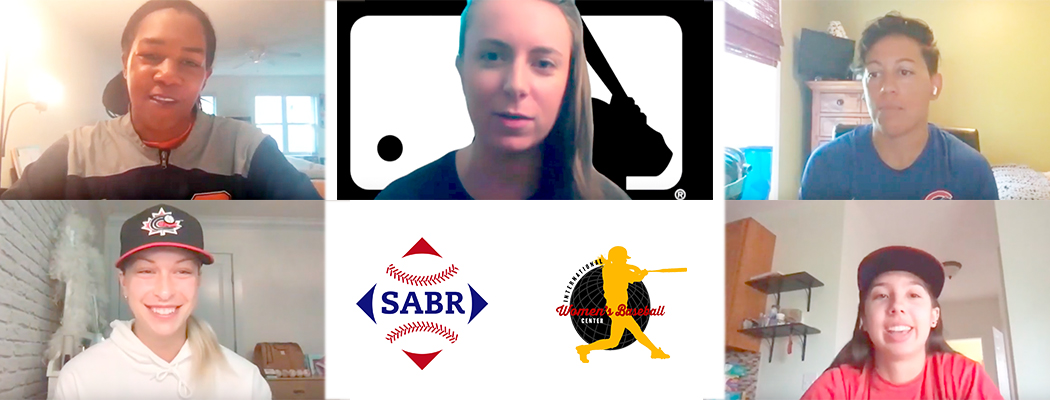Watch highlights from 2020 SABR/IWBC Women in Baseball Player Panel
At the second annual SABR/IWBC Women in Baseball Conference on Saturday, September 12, 2020, our Player Panel discussed the growth of women playing, coaching, and working in baseball at all levels.
The panel was moderated by Elizabeth Benn, Senior Coordinator of Player Programs, Baseball Development, and Diversity at Major League Baseball, and included Rachel Folden, minor league hitting coach and Lead Hitting Lab Technician for the Chicago Cubs; Marika Lyszczyk, a catcher on the Canadian women’s national team and Rivier University in New Hampshire; Bianca Smith, Assistant Baseball Coach and the Hitting Coordinator at Carroll University in Wisconsin; and Madison Femia, a high school catcher from Geneva, Illinois, who has participated in MLB’s Trailblazers Series, Girls Baseball Breakthrough Series, and the MLB GRIT: Girls ID Tour.
Here are some highlights:
ON WOMEN IN BASEBALL IN 2020
- Benn: “2020 has really been a huge year for women in coaching. There are a ton of areas we could have hit on, but it has been a really groundbreaking year for women in coaching in 2020.”
- Folden: “Baseball shifted away from having to have played baseball to work in baseball when the Moneyball revolution went through. You’re seeing Yale graduates, Columbia graduates, Harvard graduates flood into baseball with the analytics which softened the barrier a little bit. This opened the door for being able to work in baseball without having to have played the game. This tore the barrier down a little bit and it became that if someone who has never played baseball as a man was able to work in baseball, why can’t someone who never played baseball as a woman be able to work in baseball?”
ON USING ANALYTICS IN PLAYER DEVELOPMENT
- Smith: “Analytics is now more about how we can develop and (improve) player performance. This is how coaching has become genderless because now it’s less about if you played, but if you can use the analytics and use the tactics and actually develop your players. It doesn’t matter what kind of background you have and it opens doors for all kinds of people.”
ON THE DIFFERENCES BETWEEN BASEBALL AND SOFTBALL
- Folden: “Aside from the pitch is being delivered, it is really the same game. You play defense the same way, you hit the same way. The world is starting to realize if you send men into a woman’s field and do the same job, you can send women into a man’s field and do the same job.”
- Folden: “There is no shame in playing softball in college and getting your college paid for, and you can always help out on the baseball side. You can help with data collection or throwing BP and transitioning to the baseball side will be easier once your softball career is over.”
ON THE FUTURE OF WORKING IN BASEBALL
- Femia: “I think in the future we will see more diversity in baseball because of current movements. This will lead to baseball teams wanting to hire more women in the future.”
ON WOMEN IN COLLEGE BASEBALL
- Lyszczyk: “I think now that there are four [female college baseball players], we will definitely see a lot more females coming into it as it is more attainable. Now with the NIL (name, image, and likeness agreement) coming in, I think it will open up for a lot of people because more people will be interested in supporting them.”
- Smith: “I was hired as an assistant athletic director, but they knew I wanted to coach. The coach knew my background and hired me, and I was promoted to hitting coordinator in January. For me, I just kind of forced my way in and said ‘I want to do this’ and reached out to the right people.”
For more coverage of the 2020 SABR/IWBC Women in Baseball Conference, click here.
Transcription assistance by Charles Held.
Originally published: September 17, 2020. Last Updated: September 25, 2020.



